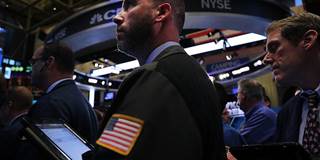Although the US economy is in good shape, a world of uncertainty makes it worthwhile to consider what could go wrong in the year ahead. The main risk is a sharp correction in asset prices, which are running well above their historical average levels.
CAMBRIDGE – Although the United States economy is in good shape – with essentially full employment and an inflation rate close to 2% – a world of uncertainty makes it worthwhile to consider what could go wrong in the year ahead. After all, if the US economy runs into serious trouble, there will be adverse consequences for Europe, Japan, and many other countries.
Economic problems could of course originate from international political events. Russia has been acting dangerously in Eastern and Central Europe. China’s pursuit of territorial claims in the East and South China Seas, and its policies in East Asia more generally, is fueling regional uncertainty. Events in Italy could precipitate a crisis in the eurozone.
But within the US, the greatest risk is a sharp decline in asset prices, which would squeeze households and firms, leading to a collapse of aggregate demand. I am not predicting that this will happen. But conditions are becoming more dangerous as asset prices rise further and further from historic norms.

CAMBRIDGE – Although the United States economy is in good shape – with essentially full employment and an inflation rate close to 2% – a world of uncertainty makes it worthwhile to consider what could go wrong in the year ahead. After all, if the US economy runs into serious trouble, there will be adverse consequences for Europe, Japan, and many other countries.
Economic problems could of course originate from international political events. Russia has been acting dangerously in Eastern and Central Europe. China’s pursuit of territorial claims in the East and South China Seas, and its policies in East Asia more generally, is fueling regional uncertainty. Events in Italy could precipitate a crisis in the eurozone.
But within the US, the greatest risk is a sharp decline in asset prices, which would squeeze households and firms, leading to a collapse of aggregate demand. I am not predicting that this will happen. But conditions are becoming more dangerous as asset prices rise further and further from historic norms.